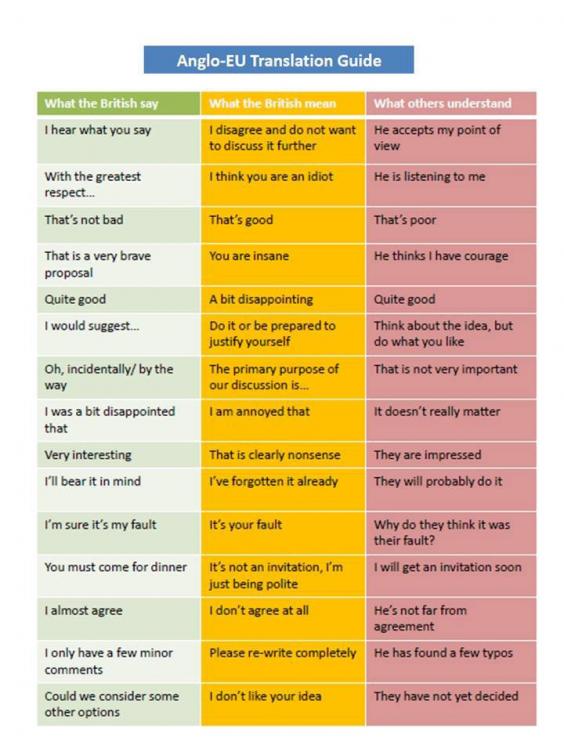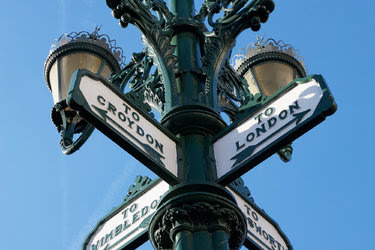Chart shows 'what the British say, what they really mean, and what others understand'
The table claims that when British people say it's 'quite good' - it's really 'a bit disappointing'
A chart that claims to show the differences between what British people say, what they really mean - and what non-British people understand by it - is being shared widely on social media.
But what is behind its success?
The three-part table was first
reported in 2011, and is split into three columns. It details examples such as, "I hear what you say", a phrase commonly used by British people in a range of social and business situations.
Contrary to what Britons think they are saying, however, what they really mean when they use the expression is, "I disagree and do not want to discuss it further" - according to the chart.
And as for what people from outside of Britain understand, it's another translation entirely.
The chart claims that rather than picking up on a lack of enthusiasm, non-native English speakers or those from other parts of the EU or beyond are actually likely to take Britons at face value and assume they are saying, "I accept your point of view".
And rather than realising that when British people murmur, "That's not bad" - and really mean "That's good" - non-Brits think they've done a terrible job.
What's more, the chart claims the phrase "very interesting", when spoken by a British person, really means "This is clearly nonsense" - while a fellow European would read it as, "they are impressed".
The chart discusses veiled language and cultural stereotypes
The nuances of such loaded conversations, which have also been analysed by
Business Insider, may seem rather baffling.
Dr Matthew Melia, a senior lecturer in Performance and Screen Studies at Kingston University, who teaches about cultural linguistics and stereotypes, told The Independent the truth behind what we say and what we really mean may depend a little on individual - and regional - characteristics.
"I’m from Liverpool and we just say what we mean," he said. "I teach television and in our first year classes we talk about how meaning is constructed and how an image can show you one thing and say something else.
"The thing that really pops into my mind is the kind of phrase you hear a lot, such, ‘I’m not racist, but…’. When people say that, it’s a subsconscious recognition that what you’re about to say is, actually, incredibly racist. And it shows that very often, people don't say what they're really thinking or what they mean because they're scared of being judged."
Dr Melia also said that the kind of language we use may depend on our career or the kind of business we're involved in.
"When I’m with my students and giving them feedback I tend to be direct," he said. "If it’s bad, it’s bad – if it’s good then it’s good. As a lecturer and tutor I have a duty to be direct with students, whereas in business there’s likely to be a whole lexicon of sayings and language, such as the phrase, ‘blue sky thinking’.
"As someone who works within academia, I don’t think it’s good to be indirect. Students need to be able to be on the same page and you can’t give them mixed messages. For me, the same rules apply with friends and family, which is probably why my mouth gets me into trouble sometimes!"
Dr Melia criticised the chart, however, for propagating an "us vs them" mentality.
"By labelling these columns, 'what the British say' and making it appear differently to those from other parts of the EU, very much marks it out as an 'us vs them' mentality," he said.
"Whereas what we say depends very much on the situation, and I would question how applicable this chart is to a wider set of social interactions.
"The first column of the chart appears to me to be a very antiquated, softened, white middle-class, polite and decorous way of making a point. It's a very loose version of what we say, and disregards all nuance."
Britain's rudest road signs
Dr Melia said he did recognise some of the phrases that the chart claims British people use often, but that he felt more familiar with the second column.
He said: "I recognise the first column, certainly - but these kind of phrases are often ways of disguising someone making a bad point. From my own experience, I recognise the second column, 'What the British mean', much more.
"I think it is always better to be direct and to let people know where you stand. It kind of annoys me when people sugar the pill. There are occasions when it needs to be done – when you're trying to be sensitive or delicate. But if you’re down the pub with your mates and someone says something clearly ridiculous then you should make your case and challenge it directly. If you do that by going around the houses then it lacks impact.
"Language doesn’t have a fixed point, it changes, it’s culturally coded."
But as for the chart's popularity, Dr Melia says that while we may think we're comfortable with stereotypes, the reality is a little different.
"Are we comfortable with stereotypes?" he says.
"Or is it actually cliche? The reason we are comfortable with cliché is because the words we say, or hear, have a recognised meaning to them."









